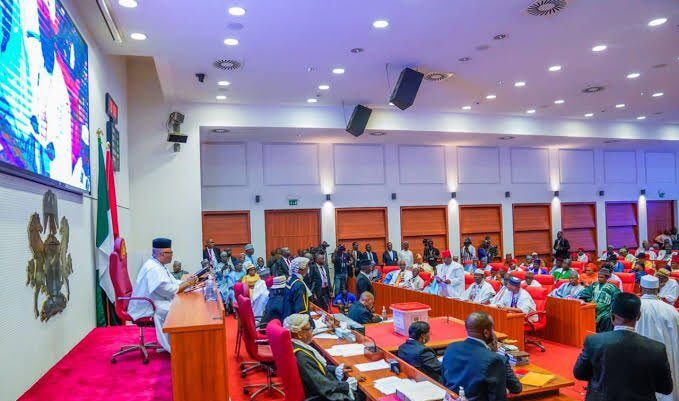The Nigerian senate yesterday passed the amendment bill of the 2023 Finance Act and increased the windfall levy on banks’ foreign exchange revaluation gains from 50% as proposed by the President to 70%.
The Chairman of the Senate Committee on Finance, Sen. Sani Musa read the report of the Committee on Finance before it was finally passed.
Furthermore, the senate also amended the commencement date of the amended act from 1st January 2023 to the commencement of the new foreign exchange policy after Sen. Aminu Waziri Tambuwal raised objection to the retroactive nature of the amendment.

Members of the red chamber also increase the timeline for the application of the windfall levy from the end of 2023 to all profits from foreign exchange transactions from the beginning of the new forex policy to the 2025 financial year as stipulated in clause 2 of the amendment.
It is important to note that the Central Bank of Nigeria (CBN) introduced the new foreign exchange policy through the unification of all segments of the foreign exchange market on June 14, 2023.
The senate also passed the amendment bill of the 2024 appropriation act to add N6.2 trillion to the 2024 budget for recurrent expenditure which includes payment of the new N70,000 minimum wage and renewed hope infrastructure projects across the country.
Backstory
President Bola Tinubu had earlier written to the senate seeking to amend the 2023 finance act to introduce the payment of a one-time windfall tax on the foreign exchange revaluation profits of banks in the 2023 financial year.
The amendment specifies that if banks fail to remit the required amount to the appropriate authority, they will, upon conviction, be required to pay the withheld tax along with a 10% penalty and interest at the Central Bank of Nigeria’s (CBN) minimum discount rate. Additionally, key principal officials may face imprisonment.
Reaction to the proposal
The proposal now amended has generated conversation around the timing and legality of the proposal with major tax and advisory bodies wading into the amendment.
KPMG Nigeria criticized the 50% windfall tax on the banks’ foreign exchange revaluation gains recorded in 2023, suggesting it could lead to legal disputes. The firm highlighted that Nigeria’s tax policy does not support retroactive taxes.
PwC Nigeria expressed concerns that the unpredictability of the windfall tax, applied to already reported profits for 2023, could discourage investments.
Furthermore, prominent lawyer Dr. Olisa Agbakoba noted that the proposed amendment to the Finance Act is an ill-thought-out policy and beyond the scope of the National Assembly. He further mentioned that if the proposal is passed, the burden will be transferred to the banks’ customers
Support InfoStride News' Credible Journalism: Only credible journalism can guarantee a fair, accountable and transparent society, including democracy and government. It involves a lot of efforts and money. We need your support. Click here to Donate
